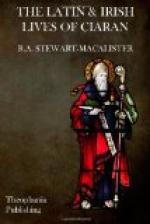Another version of the hymn was known to Colgan, and is given by him in TT, p. 472. Unfortunately he quotes only one couplet—
Quantum Christe O Apostolum mundo misisti hominem Lucerna huius insulae lucens lucerna mirabilis
which is evidently corrupt, and (as Colgan seems to regard it as the opening stanza) must show that the whole text had become disturbed by the time when Colgan wrote. Indeed, it does not appear that Colgan knew any more of the hymn than these two lines.
LIII. THE ENVY OF THE SAINTS (VG)
Note how the Latin texts soften down the saying attributed in VG to Colum Cille. A curious incident of disagreement between Ciaran and Colum Cille is thus related by Colgan (TT, p. 396). “Once there arose a petty quarrel between Kieranus and Columba, in which perhaps Kieranus, jealous for the divine honour, appeared either to prefer himself to Columba, or not to yield him the foremost place. But a good Spirit, descending from heaven, easily settled the quarrel, whatever it may have been, in this wise. He held out an awl, a hatchet, and an axe, presenting them to Kieranus: ‘These things,’ said he, ’and other things of this kind, with which thy father used to practise carpentry, hast thou abjured for the love of God. But Columba renounced the sceptre of Ireland, for which he might have hoped from his ancestral right and the power of his clan, before he made offering.’” The same tale is told in Manus O’Donnell’s Life (ed. O’Kelleher, p. 60).
The authorities differ as to the attitude which Colum Cille adopted with regard to Ciaran. But as regards the other saints of Ireland there is no ambiguity. The cutting-short of Ciaran’s life was one of the “three crooked counsels of Ireland” according to the glosses to the Martyrology of Oengus (9th September): the same authority adds that the saints “fasted for Ciaran’s death,” as otherwise all Ireland would have been his. The ancient legal process of fasting was an inheritance from Pagan times. If A had a case against B, he might, and under certain circumstances was obliged to, abstain from food till the case was settled; he was then said to “fast upon B.” The idea probably was that if a litigant permitted his adversary to starve to death, the angry ghost would ever afterwards disturb his rest. Parallels have been found in ancient Indian practice. Sometimes B performed a counter-fast; in such a case he who first broke his fast lost his cause. But the process seems to have been strangely extended, even in Christian times, to obtain boons from the supernatural Powers. We read of a saint “fasting upon God” that a king might lose a battle; and in Revue celtique, vol. xiv, p. 28, there is printed a story of a childless couple who fasted with success upon the Devil, that he might send them offspring. Two of the saints—Odran of Letrecha Odrain and Mac Cuillind of Lusk—went and told




